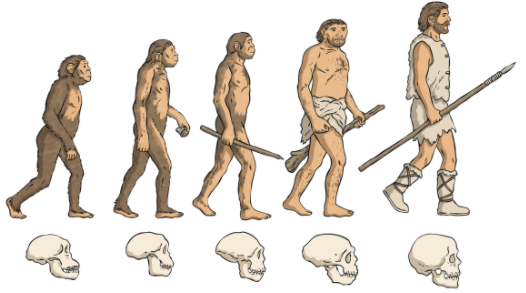Is Evolution Still a Taboo Subject?

March 24, 2022
For the first 18½ centuries of civilization, humans believed that they had been on Earth since the beginning of time. After some years, people started to suspect that a higher power, like Allah or the Christian God, had created the Earth and all of its inhabitants.
It was not until 1859 that the world-renowned naturalist, Charles Darwin, presented his theory of evolution by natural selection. It claimed that all species evolved from a common ancestor, and changed over generations based on their surroundings. Many individuals of high class or religious origin were appalled by this claim because not only did it ‘relate’ them to apes, but it did not fit their notion of divine creation.
However since then, many decades have passed, but has the attitude towards evolution changed?
Although many of us go as far to say that evolution is fact, others are still widely against the theory and it has stayed a taboo subject in many parts of the world.
In American society as a whole, a Pew Research Center study concluded that only about 8 in 10 U.S adults believe that humans have evolved over time. That statistic includes 33% of Americans who think that humans evolved due to processes like natural selection with no divine involvement and 48% who think that evolution was ‘guided or allowed’ by a higher power. Around 18% of Americans completely rejected the concept of evolution saying that humans have always existed in their present form. To many Americans living in highly urbanized or liberal areas, this data may be outstandingly shocking. Even of the people who believe that evolution occurred, the majority still cling to the idea that evolution is due to religious or divine processes.
However, the U.S. is far from the only region of the world where this mentality can be found. The Pew Research Center also found that roughly 40% of residents in the Latin American countries of Ecuador, Nicaragua, and the Dominican Republic, believe that humans and other organisms have always existed in their present form. This means that only 6 in 10 individuals believe in evolution. In Latin America, Catholicism is the majority religion, but despite what many think, the official teachings of the Church respect and support the theory of Evolution. In Central and Eastern Europe, evolution is widely accepted but more than half of individuals in the countries of Armenia and Bosnia still reject the theory. So if the religion backing many citizens’ justification of rejecting the theory of evolution believes and supports the science of evolution itself, why is it still so widely disputed and taboo? The answer is a lack of proper education.
In the American South, it was found by Dr. Amanda L. Glaze of Georgia Southern University that students are 84% less likely to receive meaningful and thorough teaching in the subject of evolution and 10x times more likely to have no instruction in evolution compared to students in the rest of the country. In the south , evolution disclaimers can still be found in science books, and creationism may be taught along with evolution in biology classes. Decades ago, in efforts to end the stigma around evolution in the south, the U.S. Supreme Court ruled that public schools in Louisiana could no longer teach both evolution and creation science because it violated the Constitution’s prohibition on the establishment of religion. Even after similar court rulings in other states, Eugenie Scott, the executive director of the National Center of Science Education says she hears all the time from teachers who feel pressured not to teach evolution because of the societal stigma and taboo that surrounds it.
All in all, it is evident that evolution is still a widely debated topic and taboo subject in many parts of the world. Growing up where we are, has sheltered us from the reality that the rest of the country may not believe the same things that we do.
In the American South, for example, Christian religion is a much bigger and more substantial part of life for many than it is here. This influences everything from politics to the conservative teaching methods in biology class!
Evolution was a groundbreaking discovery when it first came to theory in the late 19th century, and still today research is being made in the field of evolutionary biology that shapes our understanding of the world around us. In the future, as a country and a global nation, we must push for the widespread acceptance and education of evolutionary theory to continue the advancement of biological sciences.






























